 Ukrainian lawmakers from different parties scuffle during a Parliament session in Kiev on Tuesday, April 8. Ukraine has seen a sharp rise in tensions since a new pro-European government took charge of the country in February. Moscow branded the new government illegitimate and annexed Ukraine's Crimea region last month, citing threats to Crimea's Russian-speaking majority.
Ukrainian lawmakers from different parties scuffle during a Parliament session in Kiev on Tuesday, April 8. Ukraine has seen a sharp rise in tensions since a new pro-European government took charge of the country in February. Moscow branded the new government illegitimate and annexed Ukraine's Crimea region last month, citing threats to Crimea's Russian-speaking majority.  Workers clean up on April 8 after pro-Russian separatists and police clashed overnight in Kharkiv.
Workers clean up on April 8 after pro-Russian separatists and police clashed overnight in Kharkiv.  Pro-Russian protesters burn tires near a regional administration building in Kharkiv after police cleared the building on Monday, April 7.
Pro-Russian protesters burn tires near a regional administration building in Kharkiv after police cleared the building on Monday, April 7.  A masked man stands on top of a barricade at the regional administration building in Donetsk, Ukraine, on April 7.
A masked man stands on top of a barricade at the regional administration building in Donetsk, Ukraine, on April 7.  Protesters wave a Russian flag as they storm the regional administration building in Donetsk on Sunday, April 6. Protesters seized state buildings in several east Ukrainian cities, prompting accusations from Kiev that Moscow is trying to "dismember" the country.
Protesters wave a Russian flag as they storm the regional administration building in Donetsk on Sunday, April 6. Protesters seized state buildings in several east Ukrainian cities, prompting accusations from Kiev that Moscow is trying to "dismember" the country.  Pro-Russian protesters clash with police as they try to occupy a regional administration building in Donetsk on April 6.
Pro-Russian protesters clash with police as they try to occupy a regional administration building in Donetsk on April 6.  Pro-Russian activists hold a rally in front of Ukraine's regional security service in Lugansk, Ukraine, on April 6.
Pro-Russian activists hold a rally in front of Ukraine's regional security service in Lugansk, Ukraine, on April 6. 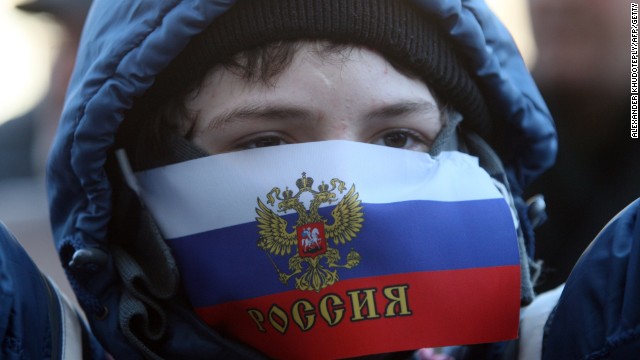 A young demonstrator with his mouth covered by a Russian flag attends a pro-Russia rally outside the regional government administration building in Donetsk on Saturday, April 5.
A young demonstrator with his mouth covered by a Russian flag attends a pro-Russia rally outside the regional government administration building in Donetsk on Saturday, April 5.  A Ukrainian soldier guards a road not far from Prokhody, a village near the Russian border, on April 5. Ukrainian and Western officials have voiced alarm about Russia's reported military buildup on Ukraine's eastern border.
A Ukrainian soldier guards a road not far from Prokhody, a village near the Russian border, on April 5. Ukrainian and Western officials have voiced alarm about Russia's reported military buildup on Ukraine's eastern border.  Ukrainian cadets at the Higher Naval School embrace a friend who has decided to stay in the school during a departure ceremony in Sevastopol, Crimea, on Friday, April 4. Some 120 cadets who refused to take Russian citizenship left the school to return to Ukraine.
Ukrainian cadets at the Higher Naval School embrace a friend who has decided to stay in the school during a departure ceremony in Sevastopol, Crimea, on Friday, April 4. Some 120 cadets who refused to take Russian citizenship left the school to return to Ukraine. 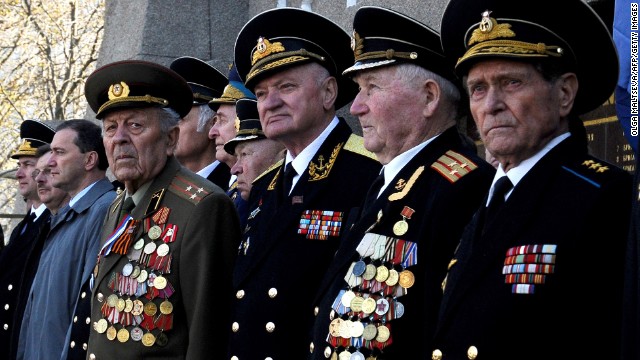 Soviet military veterans take part in a flower-laying ceremony at the Soviet-era World War II memorial in Sevastopol on Thursday, April 3.
Soviet military veterans take part in a flower-laying ceremony at the Soviet-era World War II memorial in Sevastopol on Thursday, April 3.  Ukrainian soldiers conduct a training session on the Desna military shooting range northeast of Kiev on Wednesday, April 2.
Ukrainian soldiers conduct a training session on the Desna military shooting range northeast of Kiev on Wednesday, April 2.  Russian soldiers prepare for diving training in front of a Tarantul-III class missile boat Tuesday, April 1, in Sevastopol.
Russian soldiers prepare for diving training in front of a Tarantul-III class missile boat Tuesday, April 1, in Sevastopol.  People pass by barricades near the Dnipro Hotel in Kiev on April 1.
People pass by barricades near the Dnipro Hotel in Kiev on April 1.  People walk past a train loaded with Russian tanks Monday, March 31, in the Gvardeyskoe railway station near Simferopol, Crimea.
People walk past a train loaded with Russian tanks Monday, March 31, in the Gvardeyskoe railway station near Simferopol, Crimea.  A Russian solder sits in a tank at the Ostryakovo railway station, not far from Simferopol on March 31.
A Russian solder sits in a tank at the Ostryakovo railway station, not far from Simferopol on March 31.  Russian Prime Minister Dmitry Medvedev speaks about the economic development of Crimea during a meeting March 31 in Simferopol.
Russian Prime Minister Dmitry Medvedev speaks about the economic development of Crimea during a meeting March 31 in Simferopol.  Members of the Ukrainian National Guard take part in military exercises on a shooting range near Kiev on March 31.
Members of the Ukrainian National Guard take part in military exercises on a shooting range near Kiev on March 31.  A woman cries Sunday, March 30, during a gathering to honor those who were killed during protests in Kiev's Independence Square.
A woman cries Sunday, March 30, during a gathering to honor those who were killed during protests in Kiev's Independence Square.  A woman and child walk past a line of police officers during a rally in Kharkiv, Ukraine, on March 30.
A woman and child walk past a line of police officers during a rally in Kharkiv, Ukraine, on March 30. 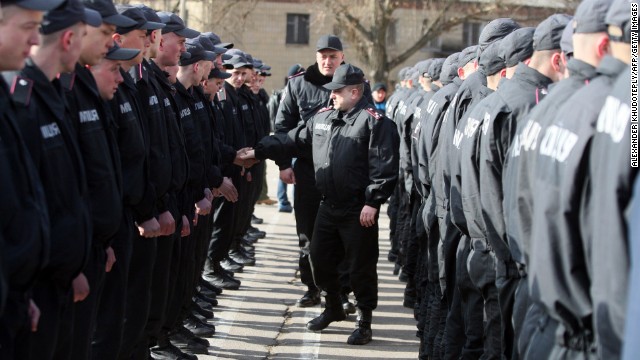 Ukrainian soldiers take part in a training exercise at a military base in Donetsk, Ukraine, on Saturday, March 29.
Ukrainian soldiers take part in a training exercise at a military base in Donetsk, Ukraine, on Saturday, March 29. 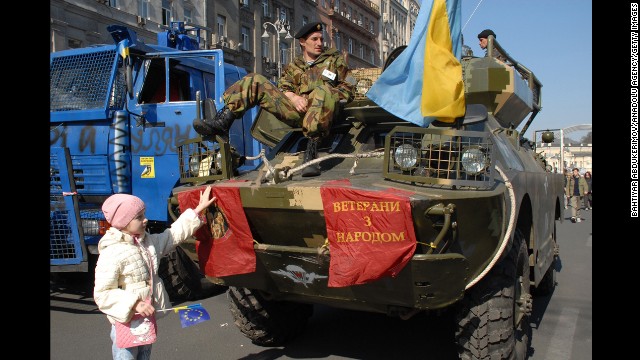 Demonstrators protest Friday, March 28, in Kiev, displaying police vehicles they seized during earlier clashes with authorities.
Demonstrators protest Friday, March 28, in Kiev, displaying police vehicles they seized during earlier clashes with authorities. 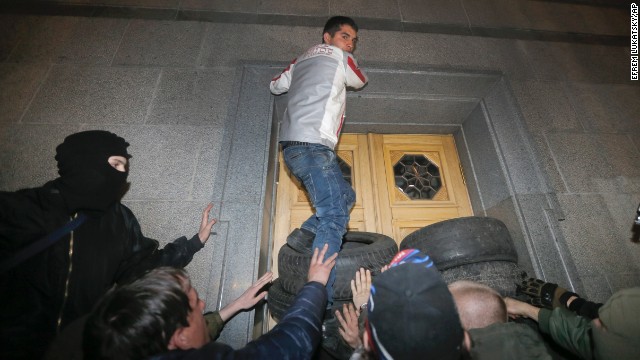 Members of the Right Sector group block the Ukrainian parliament building in Kiev on Thursday, March 27. Activists called for Interior Minister Arsen Avakov to step down after the recent killing of radical nationalist leader Oleksandr Muzychko, who died during a police operation to detain him. Muzychko and the Right Sector are credited with playing a lead role in the protests that toppled Ukrainian President Victor Yanukovych.
Members of the Right Sector group block the Ukrainian parliament building in Kiev on Thursday, March 27. Activists called for Interior Minister Arsen Avakov to step down after the recent killing of radical nationalist leader Oleksandr Muzychko, who died during a police operation to detain him. Muzychko and the Right Sector are credited with playing a lead role in the protests that toppled Ukrainian President Victor Yanukovych. 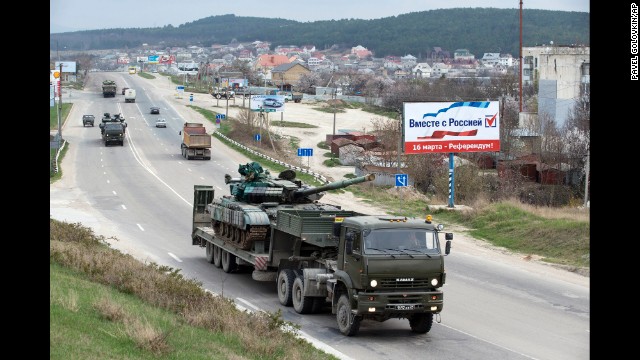 Ukrainian tanks are transported from their base in Perevalne, Crimea, on Wednesday, March 26. After Russian troops seized most of Ukraine's bases in Crimea, interim Ukrainian President Oleksandr Turchynov ordered the withdrawal of armed forces from the Black Sea peninsula, citing Russian threats to the lives of military staff and their families.
Ukrainian tanks are transported from their base in Perevalne, Crimea, on Wednesday, March 26. After Russian troops seized most of Ukraine's bases in Crimea, interim Ukrainian President Oleksandr Turchynov ordered the withdrawal of armed forces from the Black Sea peninsula, citing Russian threats to the lives of military staff and their families. 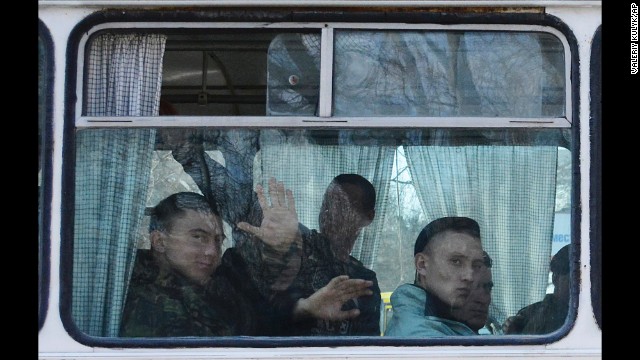 Ukrainian marines wave as they leave a base in Feodosia, Crimea, on Tuesday, March 25.
Ukrainian marines wave as they leave a base in Feodosia, Crimea, on Tuesday, March 25. 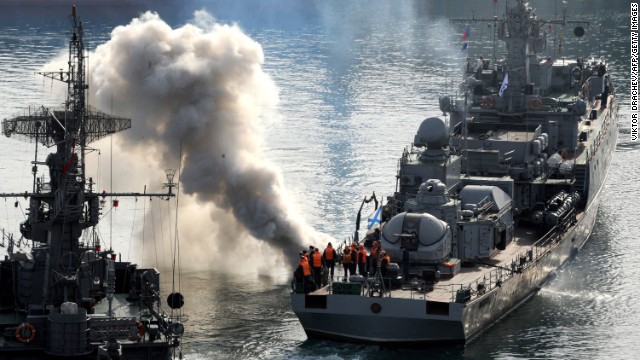 Russian sailors stand on the deck of the corvette ship Suzdalets in the bay of Sevastopol on March 25.
Russian sailors stand on the deck of the corvette ship Suzdalets in the bay of Sevastopol on March 25. 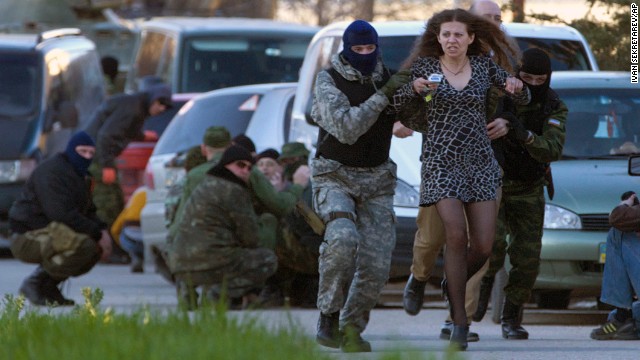 Pro-Russian militia members remove a resident as Russian troops assault the Belbek air base, outside Sevastopol, on Saturday, March 22. After its annexation of Crimea, Russian forces have consolidated their control of the region.
Pro-Russian militia members remove a resident as Russian troops assault the Belbek air base, outside Sevastopol, on Saturday, March 22. After its annexation of Crimea, Russian forces have consolidated their control of the region.  Soldiers in unmarked uniforms sit atop an armored personnel carrier at the gate of the Belbek air base on March 22.
Soldiers in unmarked uniforms sit atop an armored personnel carrier at the gate of the Belbek air base on March 22. 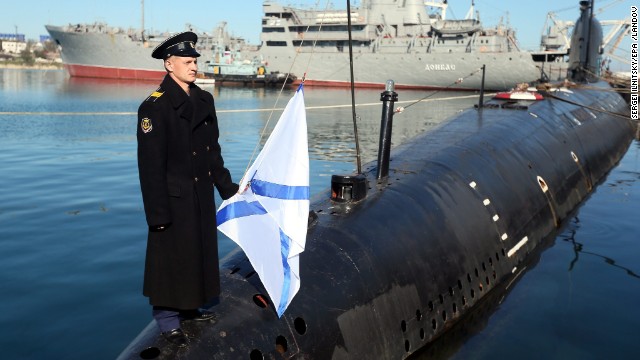 A Russian sailor holds the Russian Navy's St. Andrew's flag while standing on the bow of the surrendered Ukrainian submarine Zaporozhye on March 22 in Sevastopol.
A Russian sailor holds the Russian Navy's St. Andrew's flag while standing on the bow of the surrendered Ukrainian submarine Zaporozhye on March 22 in Sevastopol. 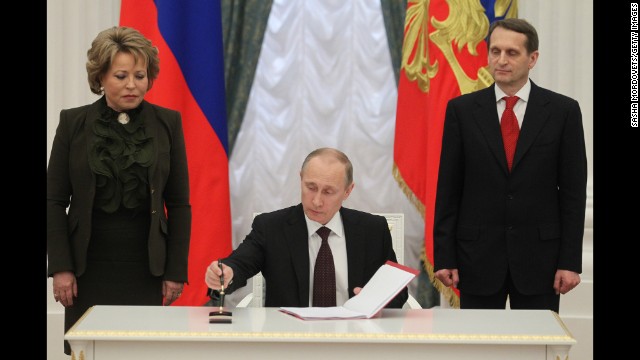 Russian President Vladimir Putin signs the final decree completing the annexation of Crimea on Friday, March 21, as Upper House Speaker Valentina Matviyenko, left, and State Duma Speaker Sergei Naryshkin watch.
Russian President Vladimir Putin signs the final decree completing the annexation of Crimea on Friday, March 21, as Upper House Speaker Valentina Matviyenko, left, and State Duma Speaker Sergei Naryshkin watch. 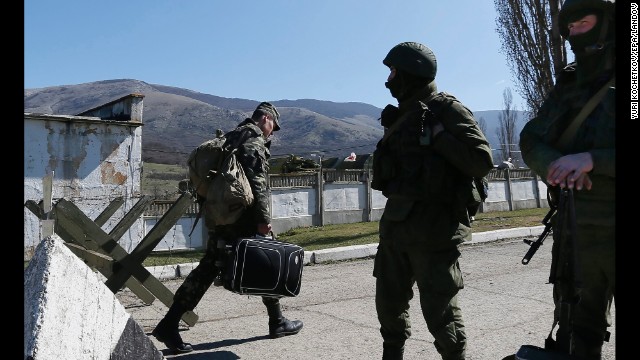 A Ukrainian serviceman leaves a Ukrainian military unit that Russian soldiers took control of in Perevalne on March 21.
A Ukrainian serviceman leaves a Ukrainian military unit that Russian soldiers took control of in Perevalne on March 21. 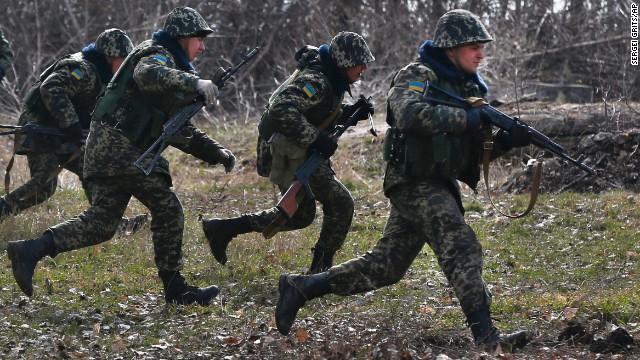 Ukrainian border guards run during training at a military camp in Alekseyevka, Ukraine, on March 21.
Ukrainian border guards run during training at a military camp in Alekseyevka, Ukraine, on March 21. 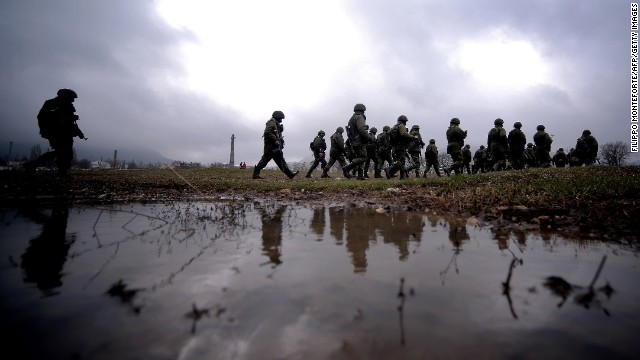 Russian soldiers patrol the area surrounding a Ukrainian military unit in Perevalne on Thursday, March 20.
Russian soldiers patrol the area surrounding a Ukrainian military unit in Perevalne on Thursday, March 20. 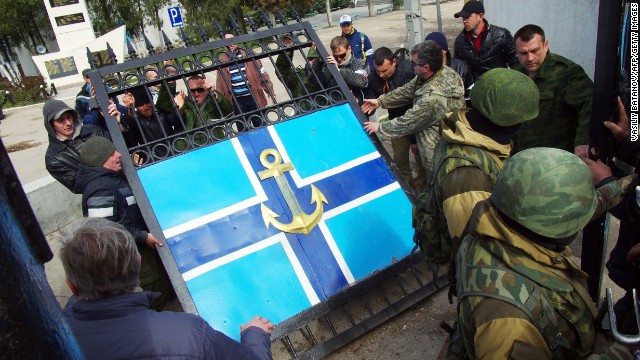 Pro-Russian protesters remove the gate to the Ukrainian navy headquarters as Russian troops stand guard in Sevastopol on Wednesday, March 19.
Pro-Russian protesters remove the gate to the Ukrainian navy headquarters as Russian troops stand guard in Sevastopol on Wednesday, March 19. 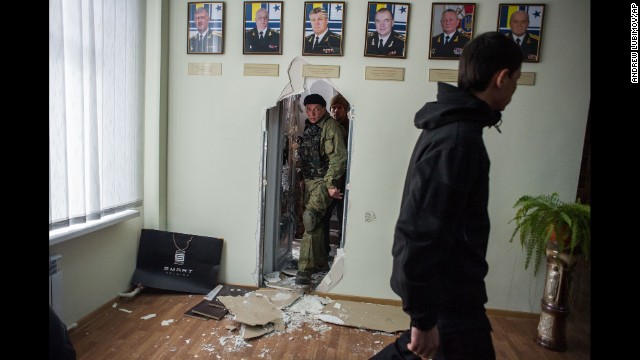 Pro-Russian forces walk inside the Ukrainian navy headquarters in Sevastopol on March 19.
Pro-Russian forces walk inside the Ukrainian navy headquarters in Sevastopol on March 19. 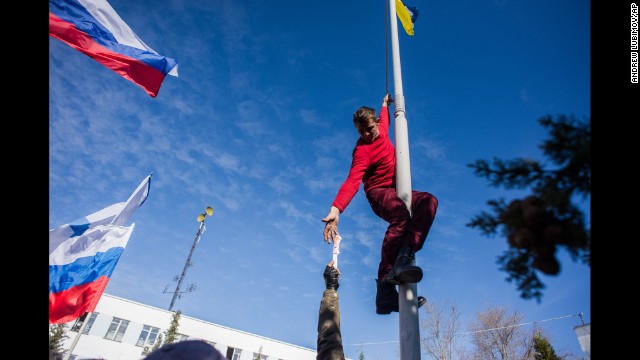 A member of pro-Russian forces takes down a Ukrainian flag at the Ukrainian navy headquarters in Sevastopol on March 19.
A member of pro-Russian forces takes down a Ukrainian flag at the Ukrainian navy headquarters in Sevastopol on March 19. 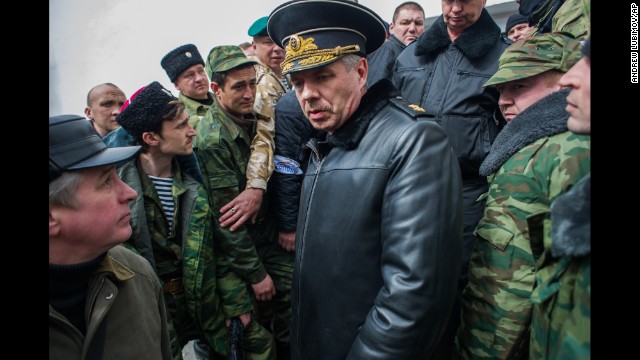 Alexander Vitko, chief of the Russian Black Sea Fleet, leaves the Ukrainian navy headquarters in Sevastopol after pro-Russian forces took it over on March 19.
Alexander Vitko, chief of the Russian Black Sea Fleet, leaves the Ukrainian navy headquarters in Sevastopol after pro-Russian forces took it over on March 19. 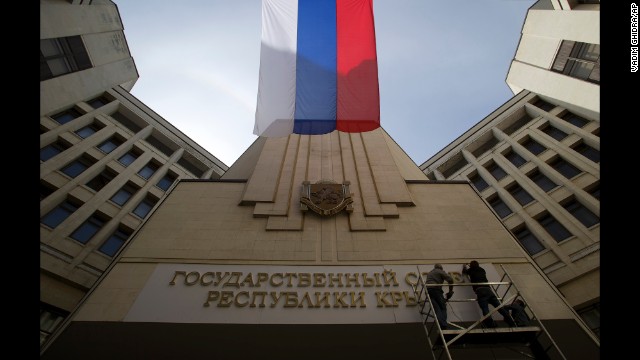 A Russian flag waves as workers install a new sign on a parliament building in Simferopol, Crimea's capital, on March 19.
A Russian flag waves as workers install a new sign on a parliament building in Simferopol, Crimea's capital, on March 19.  Russian military personnel surround a Ukrainian military base in Perevalne on March 19.
Russian military personnel surround a Ukrainian military base in Perevalne on March 19. 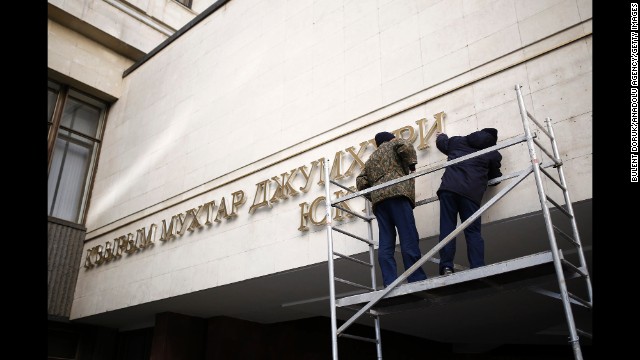 Nameplates on the front of the Crimean parliament building get removed Tuesday, March 18, in Simferopol.
Nameplates on the front of the Crimean parliament building get removed Tuesday, March 18, in Simferopol. 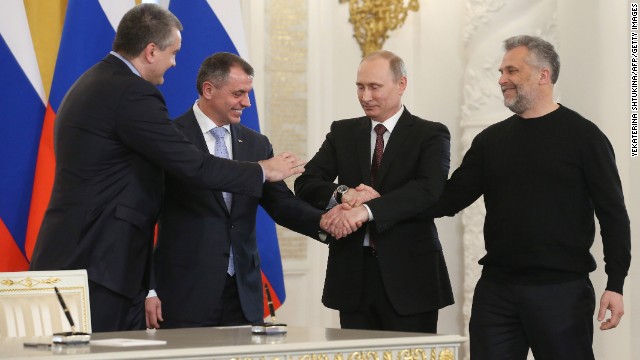 From left, Crimean Prime Minister Sergey Aksyonov; Vladimir Konstantinov, speaker of the Crimean parliament; Russian President Vladimir Putin; and Alexei Chaly, the new de facto mayor of Sevastopol, join hands in Moscow on March 18 after signing a treaty to make Crimea part of Russia.
From left, Crimean Prime Minister Sergey Aksyonov; Vladimir Konstantinov, speaker of the Crimean parliament; Russian President Vladimir Putin; and Alexei Chaly, the new de facto mayor of Sevastopol, join hands in Moscow on March 18 after signing a treaty to make Crimea part of Russia. 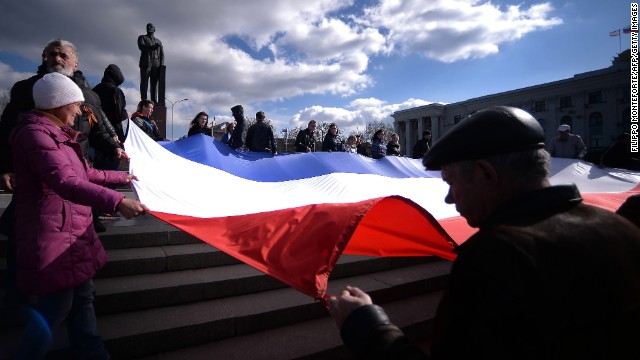 Demonstrators hold a Crimean flag at Lenin Square in Simferopol on March 18.
Demonstrators hold a Crimean flag at Lenin Square in Simferopol on March 18. 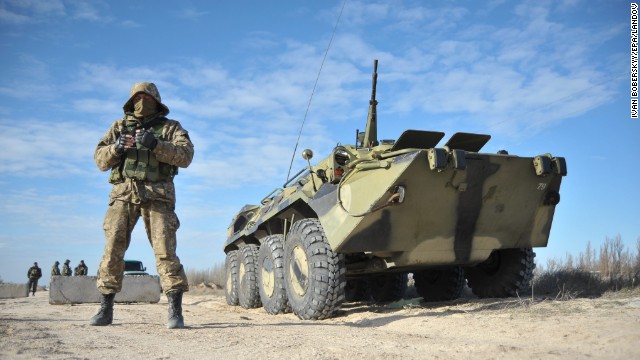 Ukrainian soldiers stand guard at a checkpoint near Strilkove, Ukraine, close to Crimea on Monday, March 17.
Ukrainian soldiers stand guard at a checkpoint near Strilkove, Ukraine, close to Crimea on Monday, March 17. 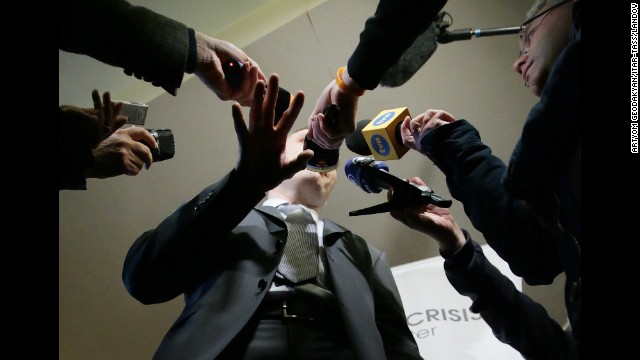 Former boxer and Ukrainian politician Vitali Klitschko addresses reporters in Kiev on March 17.
Former boxer and Ukrainian politician Vitali Klitschko addresses reporters in Kiev on March 17. 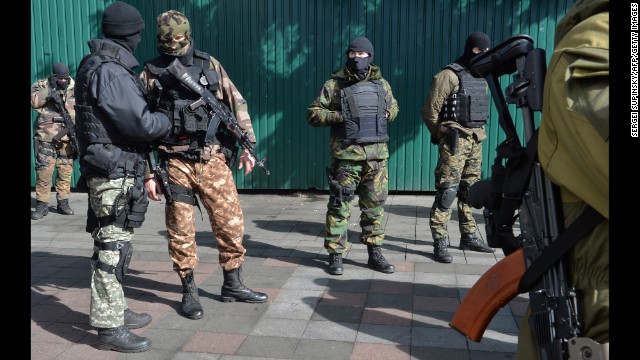 Ukrainian troops stand guard in front of the Ukrainian Parliament building in Kiev on March 17.
Ukrainian troops stand guard in front of the Ukrainian Parliament building in Kiev on March 17. 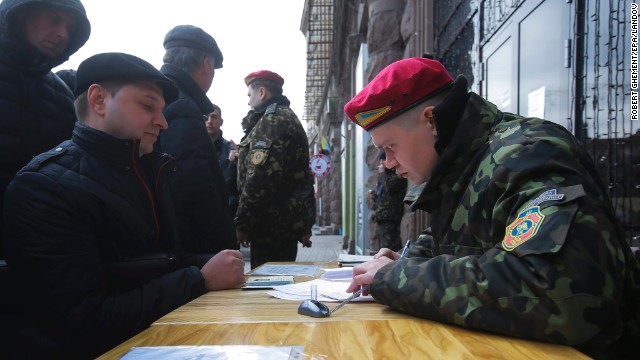 A Ukrainian man applies for the National Guard at a mobile recruitment center in Kiev on March 17.
A Ukrainian man applies for the National Guard at a mobile recruitment center in Kiev on March 17. 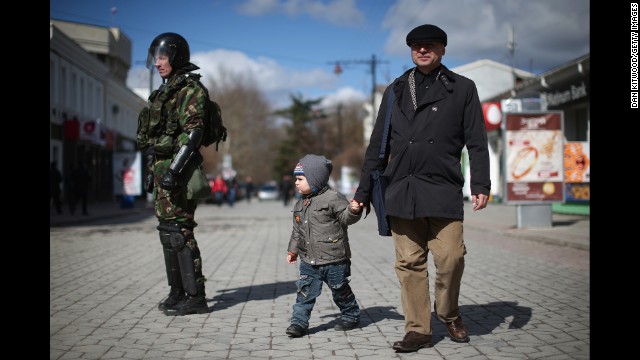 Civilians walk past riot police in Simferopol on March 17.
Civilians walk past riot police in Simferopol on March 17. 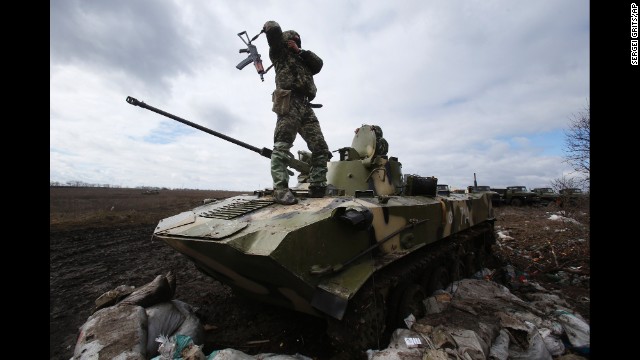 A Ukrainian soldier stands on top of an armored vehicle at a military camp near the village of Michurino, Ukraine, on March 17.
A Ukrainian soldier stands on top of an armored vehicle at a military camp near the village of Michurino, Ukraine, on March 17. 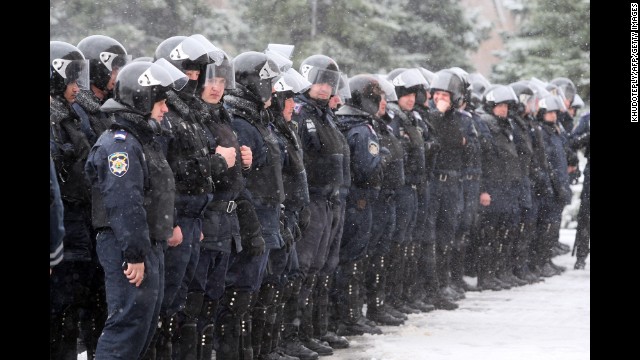 Policemen stand guard outside the regional state administration building in Donetsk during a rally by pro-Russia activists March 17.
Policemen stand guard outside the regional state administration building in Donetsk during a rally by pro-Russia activists March 17. 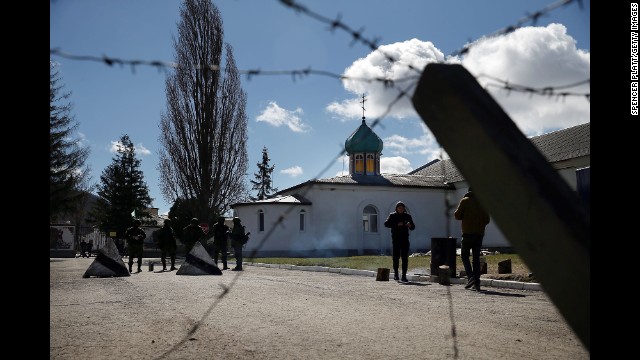 Armed soldiers stand guard outside a Ukrainian military base in Perevalne on March 17.
Armed soldiers stand guard outside a Ukrainian military base in Perevalne on March 17. 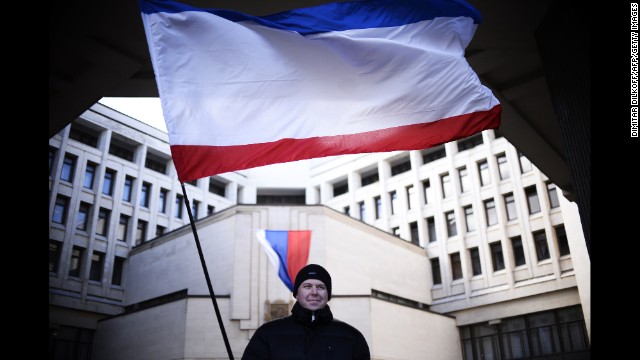 A man holds a Crimean flag as he stands in front of the Crimean parliament building in Simferopol on March 17.
A man holds a Crimean flag as he stands in front of the Crimean parliament building in Simferopol on March 17.  Crimeans holding Russian flags celebrate in front of the parliament building in Simferopol on Sunday, March 16.
Crimeans holding Russian flags celebrate in front of the parliament building in Simferopol on Sunday, March 16. 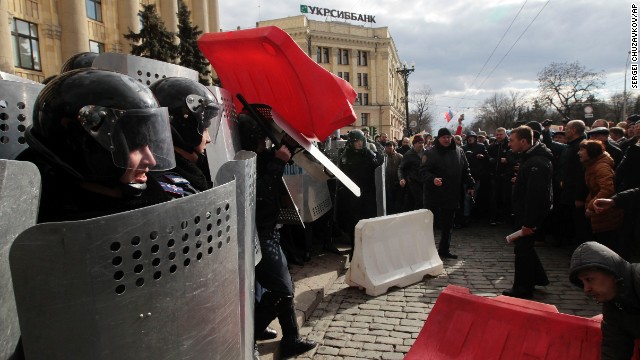 A Ukrainian police officer tries to shield himself from a road block thrown by pro-Russia supporters in Kharkiv on March 16.
A Ukrainian police officer tries to shield himself from a road block thrown by pro-Russia supporters in Kharkiv on March 16. 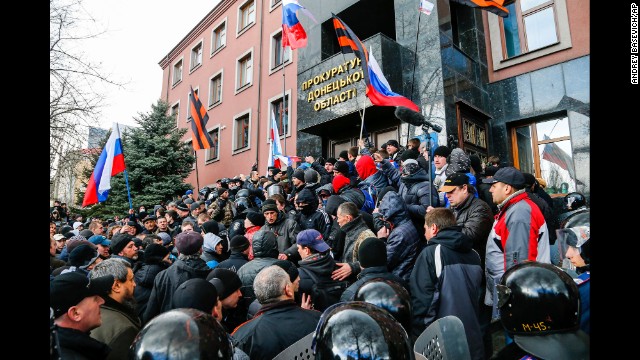 Pro-Russia demonstrators storm the prosecutor general's office during a rally in Donetsk on March 16.
Pro-Russia demonstrators storm the prosecutor general's office during a rally in Donetsk on March 16. 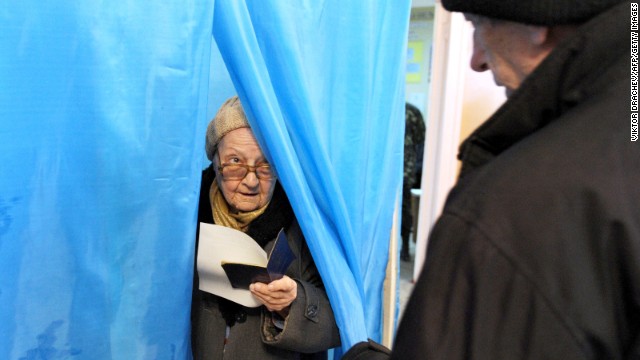 A woman leaves a voting booth in Sevastopol on March 16. See the crisis in Ukraine before Crimea voted
A woman leaves a voting booth in Sevastopol on March 16. See the crisis in Ukraine before Crimea voted
- David Frum: Time after time, President Barack Obama has ducked foreign policy challenges
- He says the President declined to be forceful on Iran, Syria, Ukraine, Venezuela
- Frum: Is Obama projecting U.S. weakness? And is that provoking others to act?
Editor's note: David Frum, a CNN contributor, is a contributing editor at The Daily Beast. He is the author of eight books, including a new novel, "Patriots," and a post-election e-book, "Why Romney Lost." Frum was a special assistant to President George W. Bush from 2001 to 2002. The opinions expressed in this commentary are solely those of the author.
(CNN) -- On June 13, 2009, hundreds of thousands took to the streets in the largest demonstrations seen in Tehran since the Iranian revolution of 1979. They were protesting what many observers said was a rigged presidential election. The regime answered with brutal repression. Security forces admitted 2,000 arrests and some 20 killings. Families of the protesters insisted that the true number of the killed was hundreds more.
Through the crisis, President Barack Obama mostly held his tongue. On June 15, he disavowed any intention by the United States to favor one side or the other. He assured Americans that the Iranian government had promised him "that they are going to look into irregularities that have taken place." Only on June 23, after 10 days of arrests, beatings, and killings, did Obama harden his tone.
That day, he expressed disapproval of the regime's "threats, beatings and imprisonments." Yet even that tougher statement was hedged with careful restraints. While deploring loss of life, the president avoided any suggestion that the regime had intentionally killed anyone. By then, of course, the "irregularities" had achieved their effect: the protests were suppressed, the election was stolen.
By crushing protesters in 2009, the Iranian regime survived to aid its clients in Syria when they faced an uprising in 2011. Iranian generals and Hezbollah militias stiffened Syrian government forces and turned the tide of war -- a war that has to date claimed perhaps 150,000 lives -- and generated the largest refugee exodus in postWorld War II history.
In August 2011, Obama called upon President Bashar al-Assad to step down. He didn't.
In August 2012, Obama declared the use of poison gas a "red line." Al-Assad crossed it. American presidents should use the language of command only very sparingly -- but when they do use it, they cannot allow their commands to be defied with impunity. Yet that, to the world's cost, is precisely what happened.
Al-Assad used poison gas in December 2012. Rather than react, the U.S. government pooh-poohed the reports. "The reporting we have seen from media sources regarding alleged chemical weapons incidents in Syria has not been consistent with what we believe to be true about the Syrian chemical weapons program."
Within hours, the Washington soft line had been contradicted by a leaked cable from U.S. officials on the Turkey-Syria border. Nothing changed. The Obama administration seemed to take the view: If we see something, we'll have to do something. We don't want to do anything, so we won't see anything.
 Poland says Russia 'financing subversion'
Poland says Russia 'financing subversion'  Donetsk separatists remain defiant
Donetsk separatists remain defiant  Photographing the Syrian refugee crisis
Photographing the Syrian refugee crisis Al-Assad did not cooperate, however. He used poison gas again, in attacks of escalating deadliness, through the spring of 2013. Obama threatened military action -- and again nothing much happened. A Russian plan to deactivate Syrian weapons has bogged down, with the Syrians gaining extensions and more extensions.
As of March 2014, Syria still retained a majority of its original chemical stockpile. In the meanwhile, the government continues to gain the upper hand over the rebels.
Did al-Assad's successful crossing of Obama's red line embolden another al-Assad ally, Russia's Vladimir Putin?
Over the past six months, the sovereign state of Ukraine -- a country of 50 million -- has chased out a corrupt authoritarian Russian-backed president and attempted to reorient itself to Europe and the West. Russia has invaded and annexed the Ukrainian territory of Crimea -- the first time since 1945 that a larger European country has taken territory from a smaller. The U.S. response has again been muted. Obama's most recent statement about Ukraine, delivered in Europe on March 26, belittled the significance of what has happened there.
"To be honest, if we define our -- our interests narrowly, if we applied a cold-hearted calculus, we might decide to look the other way. Our economy is not deeply integrated with Ukraine's. Our people and our homeland face no direct threat from the invasion of Crimea. Our own borders are not threatened by Russia's annexation." He concluded: "Now is not the time for bluster. The situation in Ukraine, like crises in many parts of the world, does not have easy answers nor a military solution."
Meanwhile, in Venezuela, another authoritarian regime is violently suppressing student protesters. Venezuela, too, seems to have got the message: All clear, nothing to fear from Washington. The President's response? A four-sentence statement delivered at a press conference in Mexico back in February that seemed to lay blame on all parties.
"I want to take this opportunity to address the situation in Venezuela and Ukraine, and the unacceptable violence in those two countries, which the United States strongly condemns.
"In Venezuela, rather than trying to distract from its own failings by making up false accusations against diplomats from the United States, the government ought to focus on addressing the legitimate grievances of the Venezuelan people. So, along with the Organization of American States, we call on the Venezuelan government to release protesters that it's detained and engage in real dialogue. And all parties have an obligation to work together to restrain violence and restore calm."
In crisis after crisis, the United States seems just AWOL. And there's an emerging pattern to this passivity: all four of these cases -- Iran, Syria, the Russian invasion of Crimea and Venezuela -- involve governments in which Obama tried to engage in dialogue. In each case, the government in question preferred violent repression to dialogue. And in each case, the violently repressive government got away with its actions, leaving the United States and its eloquent President defied, outmaneuvered and tongue-tied. The Crimea situation isn't over yet. But it does seem likely to follow the same path as the other cases.
The pattern established here is embarrassing to the United States and destabilizing to the world.
Obama blames his predecessor as too provocative. But, as the saying goes, weakness is provocative, too. By that measure, the United States has seldom provoked more trouble than it is provoking today.
Follow us on Twitter @CNNOpinion
Join us on Facebook/CNNOpinion
No comments:
Post a Comment